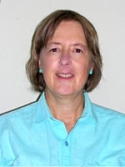ACEP2019logo.jpg
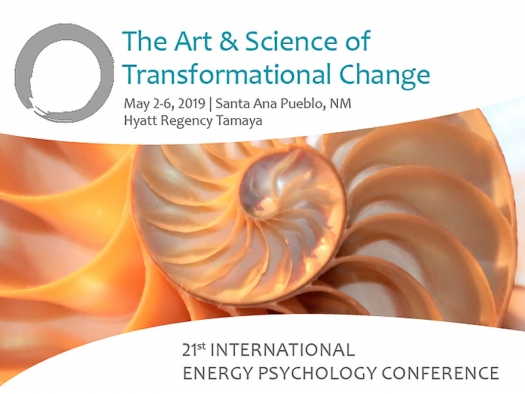
ACEP
The 21st International Energy Psychology Conference, produced by the Association for Comprehensive Energy Psychology (ACEP), was held May 2-6 at the Santa Ana Pueblo in New Mexico. This was their largest gathering so far, with 535 attendees from 45 states and 10 countries outside of the United States.
People may wonder: what is “energy psychology”? According to Cynthia Joba, ACEP’s Director of Outreach and Communication: “Energy psychology comprises a family of methods designed to strategically and methodically intervene with human energy fields in elevating physical, mental, emotional and spiritual well-being. These approaches are used by practitioners of psychotherapy, counseling, coaching, energy healing, and health optimization. Practitioners view issues as systemic, interactive bio-energetic patterns. This involves constant complex communication among neurobiological processes, electrophysiology, consciousness, and bioenergy systems (which may include the biofield, chakras, and meridians). Practitioners use a variety of techniques to help clients shift the flow of information and energy throughout these systems.”
ACEP2019b.jpg
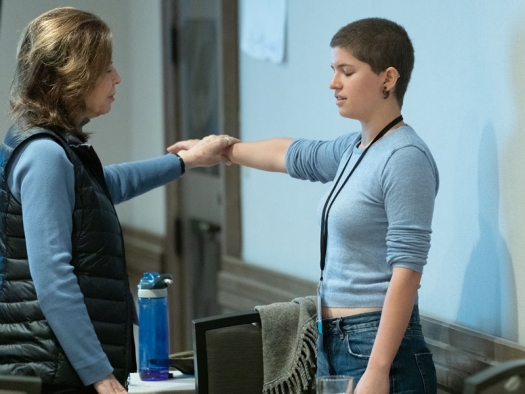
Kris Olson / FAIM
Participants at the ACEP Conference.
ACEP is a professional home for all kinds of energy practitioners. A major focus of energy psychology (EP) is to facilitate healthy change through the ability to reduce the effects of trauma and stimulate healing. ACEP’s mission is to integrate EP methods into mainstream healthcare and communities.
This year’s conference featured several keynotes as well as 45 breakout sessions divided into nine tracks: Fundamentals of Energy Psychology, Specific Populations, Specific Approaches, Energy Healing Methods, The Many Faces of Trauma and Violence, Practices for Higher Consciousness, Strengthening Resilience and Improving Performance, The Craft and Science of Therapeutic Change and Potpourri of Energy Psychology.
Keynote speakers introduced topics such as human resilience, the properties of energy fields, innovations in health care and the nature of consciousness. This then served as a framework for understanding how EP techniques could be utilized for health and well-being.
The conference officially opened on Thursday, with the Research Symposium, special pre-conference workshops and a keynote by Bill O’Hanlon: “The Four Energies: The Compass for Knowing What to Do with the Rest of Your Life.”
Joan Borsysenko, PhD
The Art and Science of Resilience
ACEP2019JoanBorsysenko.jpg
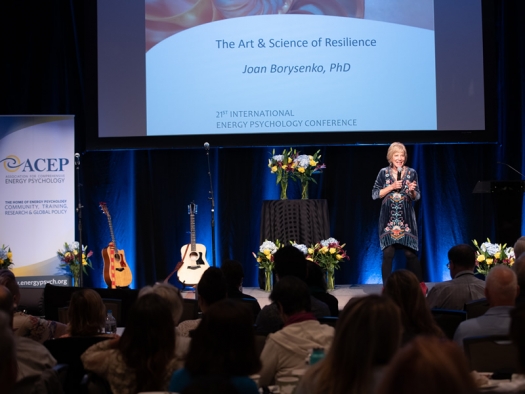
Kris Olson / FAIM
Joan Borsysenko, PhD, opened Friday’s session with a keynote entitled “The Art and Science of Resilience.” Spirituality, she said, is all about emotion and social connection. Resilience and spirituality are basically the same thing: a deep connection to self and others, with the capacity to create redemptive meaning in difficult situations. She discussed common traits of resilient people and organizations. They include interpersonal connections, realism, creativity, and faith in the possible. Traits like wisdom, courage, humanity, justice, temperance and transcendence are critical for the evolving human. As we grow and embrace these traits, we can transform ourselves into a more positive society.
Beverly Rubik, PhD
The Biofield in Health and Healing: Scientific Update and Practical Applications
ACEP2019BeverlyRubik.jpg
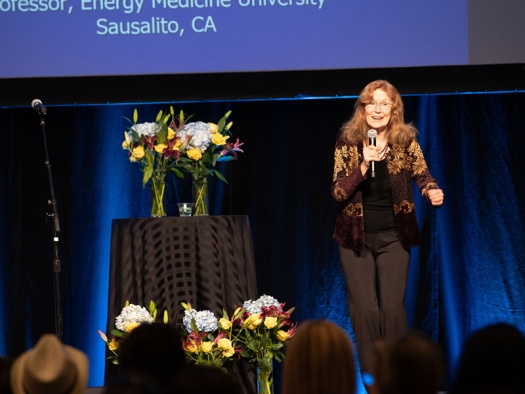
Kris Olson / FAIM
Beverly Rubik, PhD, presented “The Biofield in Health and Healing: Scientific Update and Practical Applications.” She focused on three areas: defining the biofield, measuring the biofield, and showing the impact of wireless technology on the biofield and health. Dr. Rubik discussed the field concept in biology and medicine. She defined the biofield as “energy fields within/around the body that can be electrical, magnetic, electromagnetic, acoustical and other ‘subtle’ energies.”
The “energy body,” or biofield, is the active organizing field of each organism. It is a dynamic, complex field – in other words “Nature’s original wireless.” It carries bio-information involved in life functions. The prevailing theory is that the biofield can impact the physiology and chemistry of the body. It controls homodynamics through physiological and biochemical regulation. Dis-ease stems from somatization, when a person experiences an emotional or psychological symptom (anxiety, depression), then develops a physical symptom (nausea, pain). Any emotional or energetic issue can be taken into the body in a physical form. As a result there develops an energetic disturbance – an energy deficit, energy blockage, insufficient flow of energy or disconnection from the source of universal life energy. Integrative and energetic therapies “nudge” the biofield and move it to a new homodynamic state, which, over time, can stabilize. Changes in structure and function follow, leading to physiological regulation, stress hardiness and resistance to disease. Dr. Rubik cited some of the many modalities used to heal the biofield, including energy psychology and energetic healing modalities such as Reiki, medical qi gong, and Healing Touch. She noted that consciousness is the conductor of the biofield.
Measuring the biofield can be accomplished through the use of such tools as EEG/ECG, applied kinesiology, EAV, and biophoton emission. Dr. Rubik presented several studies that measured the effect of energy healing modalities on both the healer and recipient. Finally, she discussed electro-sensitivity and the effect of wireless technologies on human health. She showed some compelling studies of how these frequencies, particularly with the emergence of 5G technology, could have a severe impact on both humans and the environment. (Dr. Rubik is a National Resource Coordinator for FAIM.)
Kenneth Pelletier, PhD, MD
Change Your Genes, Change Your Life: Creating Optimal Health with the New Science of Epigenetics
Kenneth Pelletier, PhD, MD, spoke on “Change Your Genes, Change Your Life: Creating Optimal Health with the New Science of Epigenetics” and reviewed the latest research in the field of genetics and epigenetics. DNA, he noted, is not our destiny, but a blueprint that we can modify with healthy lifestyle choices like diet, stress management and reducing exposure to environmental toxins. He discussed the emergence of “personalized medicine” – focusing on an individual’s unique combination of genetic SNPs, microbiome, blood markers and environment.
Understanding this can facilitate recommendations that will optimize health and longevity. Data accumulated by the Weizman Institute in Israel identified over 1.5 million individual mircobiome profiles. Dr. Pelletier revealed how people with different microbiomes could have vastly different glycemic responses to the same food. He talked about the “7 Pillars of Optimal Health” and reviewed research on telomere length. He noted that cultures with higher longevity rates shared similar indicators like healthy diet, stress management and social support, among others. He concluded: we can turn our genes on and off like a rheostat: what we do matters!
Invited presentations
ACEP2019VictorLeeLewis.jpg
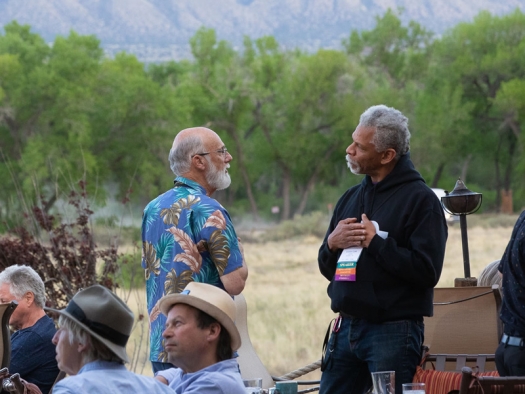
Kris Olson / FAIM
Victor Lee Lewis, MA, (right) talks with a participant at an outdoor gathering during the ACEP conference.
On Saturday afternoon there were several invited presentations:
- Jeffrey Rediger discussed “A Medicine of Hope and Possibility: Using the Stories of Amazing People to Drive Change in Healthcare.”
- Mingtong Gu reviewed basic sound therapies from his Qigong program in a talk, “Awaken to Your Wholeness Through the Transformation of Energy.”
- Victor Lee Lewis presented “Healing the Divide: How Diversity and Energy Psychology are Better Together.”
- Joanne Callahan gave a review of the latest findings with TFT in her talk “Negative Polarity and the Evolution of TFT – Where Are We Now?”
Larry Dossey, MD
Consciousness and Healing: The Unfolding Vision
Closing the conference, Larry Dossey, MD, discussed “Consciousness and Healing: The Unfolding Vision.” He discussed the scientific community’s opinions about consciousness which range from “no such thing” to “a complex unfolding quantum force.” He quoted many different scientists and spiritual leaders. In the new scientific view, consciousness is not in the brain, but used by the brain. He discussed studies of twins and meta-analyses of non-local healing from the University of Northampton showing that intentions can impact healing in almost any organism. He noted that many new studies, as well as increasing cases of spontaneous remission, have led to more interest in studying the nature of consciousness.
In addition to the keynotes there were 45 breakout sessions in nine tracks that one could choose to attend. Topics were related to energy psychology modalities and skills, shamanism, energy healing, assessment tools, understanding the body, pain resolution, dealing with trauma, sound and color healing, brain imaging, community outreach and others. Particularly encouraging were the reports of how EP tools have helped heal both individual and collective trauma in former war zones like Rwanda. Such stories lend support to ACEPs long term goal of integrating these techniques into first-line trauma treatment.
ACEP2019c.jpg
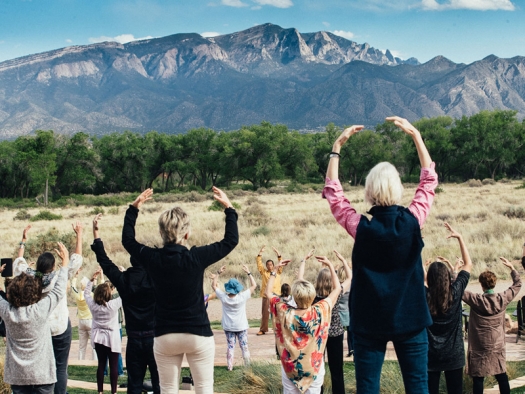
Kris Olson / FAIM
Participants at the ACEP Conference doing outdoor exercises with the mountains in the background.
Breakout session presenters included Diana Badilla, Debra Greene, Kristin Holthuis, Terry Lynch, Anne Jensen, Sandra Radomski, Ruba Homaidi, Kathy Milano, Michael Reddy, B. Raven Lee, Margaret Lynch, Lori Chortkoff Hops, Daniel Benor, Lynn Karjala, Nora Baladerian, Suzanne Connolly, Thomas Altaffer, Jef Gazley, Brent Baum, Mary Sise, Gregory Carpenter, Phil Mollon, Eleanor Hamilton, Michael Galvin, John Diepold, Jr, Judith Swack, Gaisheda Kheawok, Amy Frost, Rachel Michaelson, Kristin Miller, Jondi Whitis, Shoshana Garfield, Alfred Heath, Caroline Sakai, Barbara Stone, Jeffrey Rediger, Mingtong Gu, Jeff Marksberry, Nadia Hole, George Limberakis, Suzanne Velasquez-Sheehy, Manohar Croke, Khadijat Omobolanle Quadri, Eva Malanowski, Ben Schwarcz, Diane Chrestman, Marlene Cameron, Sheran Mattson, Amanda Freger, John Freedom, Georgia Howorth-Fair, Sarette Zecharia, Jeannette Folan, Emma Bragdon, William Lyon, Diane Puchbauer, Yves Wauthhier, Tapas Fleming, Pamela Altaffer, David Gruder, Rick Leskowitz, Larry Burk, Theresa Lynch, Ellen Franklin, Fred Gallo, John Freedom, Melinda Connor, David Feinstein, Ken Cohen and Asha Clinton.
The next International Energy Psychology Conference will be held at the Hyatt, Baltimore Inner Harbor from May 13-18, 2020. If you want to receive a notice when VIP pricing is available, sign up at the Energy Psychology Conference website. You’ll also get a free, past conference keynote by William Bengston, PhD, titled “Can Healing Be Made Practical, Scalable and Conventional?”
For more information about ACEP, go to the Association for Comprehensive Energy Psychology (ACEP) website.

